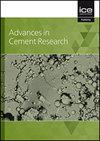Strength characteristics of cement slurry in high geothermal tunnel environment
IF 1.4
4区 工程技术
Q3 CONSTRUCTION & BUILDING TECHNOLOGY
引用次数: 0
Abstract
The early-age strength of grouting material is crucial for tunnel support under high geothermal temperatures. Grouting materials (such as the most commonly used cement slurry) hydrate and solidify under the condition of variable temperature curing after entering the real stratum. However, the development process of early strength of cement paste under the condition of variable temperature curing is still unclear. This study aims to elucidate the environmental effects of high ground heat tunnels on the early strength development of cement stone. The cement slurry undergoes variable temperature curing under three different temperatures (T=40℃, 60℃, 80℃) and two different relative humidity conditions (H=5%, 95%) through design experiments. Through the compressive strength test, combined with X-ray diffraction (XRD), scanning electron microscope (SEM) and nuclear magnetic resonance (NMR), the microscopic characteristics were studied. The results indicate that the strength of cement stone under variable temperature curing is lower than that under constant temperature curing at the same temperature. The influence of variable temperature curing conditions on the strength variation of samples with high W/C and age was greater at 80℃. The research results are helpful to understand the influence of environmental effects of high ground temperature tunnels on the properties of grouting materials.高地热隧道环境中水泥浆的强度特性
灌浆材料的早期强度对于隧道在高地温条件下的支护至关重要。灌浆材料(如最常用的水泥浆)进入实际地层后,在变温固化条件下水化凝固。然而,水泥浆在变温固化条件下早期强度的发展过程尚不清楚。本研究旨在阐明高地热隧道对水泥石早期强度发展的环境影响。通过设计实验,水泥浆体在三种不同温度(T=40℃、60℃、80℃)和两种不同相对湿度条件(H=5%、95%)下进行变温养护。通过抗压强度试验,结合 X 射线衍射(XRD)、扫描电子显微镜(SEM)和核磁共振(NMR),研究了水泥的微观特性。结果表明,水泥石在变温养护条件下的强度低于相同温度下的恒温养护条件。变温养护条件对高 W/C 和龄期样品强度变化的影响在 80℃ 时更大。研究结果有助于了解高地温隧道环境效应对灌浆材料性能的影响。
本文章由计算机程序翻译,如有差异,请以英文原文为准。
求助全文
约1分钟内获得全文
求助全文
来源期刊

Advances in Cement Research
工程技术-材料科学:综合
CiteScore
3.70
自引率
5.00%
发文量
56
审稿时长
3.2 months
期刊介绍:
Advances in Cement Research highlights the scientific ideas and innovations within the cutting-edge cement manufacture industry. It is a global journal with a scope encompassing cement manufacture and materials, properties and durability of cementitious materials and systems, hydration, interaction of cement with other materials, analysis and testing, special cements and applications.
 求助内容:
求助内容: 应助结果提醒方式:
应助结果提醒方式:


